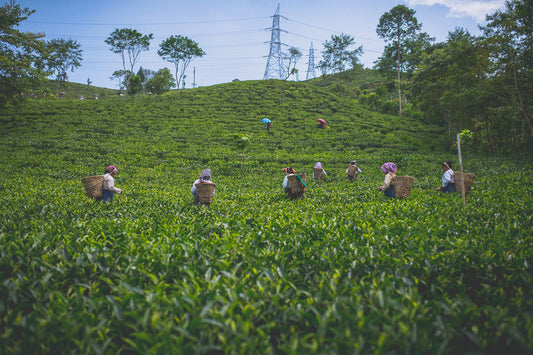Our journey to discover the finest teas of Darjeeling led us to Jungpana Tea Estate, a mystical haven known for producing some of the most sought-after second-flush teas in the world. Perched on the slopes of Kurseong at an altitude ranging from 2,400 to 6,100 feet, Jungpana enjoys a unique terroir that contributes to its signature muscatel flavors and refined aromas.
The Fascinating Legend Behind Jungpana’s Name
Jungpana’s origin is steeped in folklore. According to legend, the name “Jungpana” traces back to a nobleman named Jung, who, fatally wounded by a leopard while on his rounds, uttered his last word — “pani,” meaning water in Nepali. His plea for water became the estate’s name, symbolizing its rich heritage and deep-rooted connection to the land.
A Legacy of Excellence: From History to Modern-Day Triumph
Jungpana was acquired by the Kejriwal family in 1956 and has since cemented its reputation as a producer of world-class teas. The estate’s south-facing slopes provide extra hours of sunlight, enhancing the flavor complexity of its teas. Its isolation from the bustling world allows for a traditional approach to tea cultivation and manufacturing, ensuring that each batch retains the purity and distinctiveness that Jungpana is renowned for.
Breaking Barriers: Lassi Tamang – The First Female Garden Manager
A remarkable highlight of Jungpana’s journey is its progressive leadership. The estate boasts the distinction of being managed by Lassi Tamang, the first female garden manager to run a tea estate in Darjeeling. Her meticulous attention to quality and sustainable practices has propelled Jungpana to new heights, reinforcing its standing as one of Darjeeling’s finest tea gardens. Lassi Tamang’s leadership has not only set a precedent for inclusivity in the traditionally male-dominated tea industry but also elevated Jungpana’s reputation for producing high-quality teas. Her emphasis on empowering local workers, enhancing plucking techniques, and ensuring high-quality manufacturing processes has been instrumental in Jungpana’s success.
Unmatched Terroir and Organic Excellence
Jungpana’s ideal altitude, coupled with its organic farming practices, contributes to its distinctive teas. The soil, rich in minerals, combined with abundant rainfall, produces leaves that are vibrant and full of character. Jungpana remains fully organic-certified, ensuring that its teas are not only exquisite but also environmentally conscious. The estate’s commitment to sustainability extends to its manufacturing process, where traditional hand-plucking and minimal interference preserve the tea’s natural essence.
An Island in the Mountains: Jungpana’s Unique Accessibility
Jungpana’s charm lies in its isolation. Accessible only via a trek up 600 steep steps, every commodity — from rations to manufactured tea — is manually hauled up or down, adding to the mystique of this mountain enclave. Despite its remote location, the estate operates with unmatched efficiency. The factory, perched atop the mountain, is where the magic happens — where freshly plucked leaves are expertly transformed into teas that captivate tea lovers across the globe.
Award-Winning Teas: A Testament to Quality
Jungpana has consistently outshined its peers in global competitions. Its second flush teas, known for their signature muscatel notes, have won numerous accolades, including the North American Tea Championship. In a region where competition is fierce, Jungpana’s ability to outperform even the best estates like Castleton speaks volumes about its unparalleled quality.
Peak Second Flush: The Crown Jewel of Jungpana
The highlight of Jungpana’s production is undoubtedly its second flush harvest, which takes place between May and June. The leaves, plucked at the peak of summer, develop a rich amber liquor with muscatel complexity. The dry leaves are often dark with golden tips, releasing an intoxicating aroma. When brewed, the cup reveals layers of fruity sweetness, subtle spice, and a lingering floral aftertaste that defines Jungpana’s signature second flush.
The Precision Behind Jungpana’s Manufacturing Process
The manufacturing process at Jungpana involves a meticulous sequence of steps that enhance the tea’s natural characteristics. After plucking, the leaves undergo withering to reduce moisture content, followed by rolling to release essential oils. Fermentation or oxidation is closely monitored to develop muscatel notes, and finally, the leaves are carefully dried and sorted. This traditional process, paired with the manager’s focus on innovation, ensures that every batch meets the highest standards.
Why Jungpana Deserves a Place in Your Collection
Jungpana’s teas encapsulate the magic of Darjeeling’s second flush. For tea enthusiasts seeking complexity, refinement, and a story steeped in history, Jungpana offers a sensory journey that is both enriching and unforgettable. Whether enjoyed plain or with a touch of milk, these teas leave an indelible mark on the palate, making them a prized addition to any collection.
Plan Your Visit to Jungpana Tea Estate
A visit to Jungpana Tea Estate is a rewarding adventure that immerses you in the history, culture, and craftsmanship of Darjeeling’s finest teas. The climb may be arduous, but the experience of witnessing this isolated gem and tasting its remarkable teas makes it all worthwhile. The estate also offers breathtaking views of the surrounding hills, making it an unforgettable experience for both tea connoisseurs and nature lovers.



